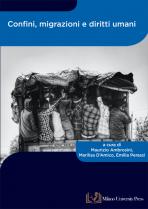Keywords:
Borders, International migrations, Human Rights, Immigration Policy, Refugees
Synopsis
Although there had long been pressing demands to limit international migration, the terrorist attacks of 11 September 2001 marked an emblematic turning point in national border policies. The new century ushered in renewed efforts by national governments, and hence European policymakers, to re-instate stricter controls on trans-border mobility, even at the cost of violating international agreements and compromising commitments to the protection of human rights.
The theme of borders has also been a domain of inquiry for academia and the scientific community. Various scientific disciplines have pooled resources and initiated dialogue with the larger society on issues such as boundaries, migrations, and human rights. This volume is the fruit of an initiative by the UNIMI Migration and Human Rights Research Centre and offers the thoughts and insights of a number of authors, contributing a range of disciplinary perspectives to bear on this critical issue of our times.
Chapters
-
La tutela dei diritti costituzionali dei migranti ai confini
Marilisa D'Amico, Cecilia Siccardi
-
Confini, migrazioni, accoglienza: una sfida per le società democratiche
Maurizio Ambrosini
-
Invenzione di confini, invenzione di spazi giuridici. Cittadini, sudditi e migranti nella storia del diritto
Claudia Storti, Filippo Rossi
-
Le frontiere nel diritto dell’Unione europea: norme, evoluzione, significato
Bruno Nascimbene, Alessia Di Pascale
-
Il pluralismo religioso e culturale in carcere, terra di confine dei diritti, nell’età della sicurezza
Daniela Milani, Alessandro Negri
-
Aspetti psicologici del confine: dall’io-pelle alle relazioni con gli altri e con la spiritualità
Paolo Inghilleri, Tatiana Tolusso
-
Narrative latinoamericane del confine. Dalla traversata oceanica alla Frontera Norte
Emilia Perassi
-
«Can a Tale Become a Home?»: lo Storytelling e la parola che sconfina
Lidia De Michelis, Claudia Gualtieri
-
Gli ‘inconfinabili’: l’eccezione che conferma la regola?
Elisa Fornalé, Laura Odasso
Downloads
Download data is not yet available.
Author Biographies
Maurizio Ambrosini, University of Milan, Milan, Italy
Maurizio Ambrosini, PhD, is professor of Sociology of Migration at the University of Milan, Department of Social and Political Sciences, and chargé d’enseignement at the University of Nice-Sophia Antipolis (France). He is also the editor of the journal “Mondi Migranti”, the Director of the Italian Summer School of Sociology of Migrations, and member of the National Council of Economy and Labour (CNEL). He is the author of more than 300 publications in the field of migration studies. His handbook, Sociologia delle migrazioni (2020, 3rd edition), has been adopted as the textbook in many Italian universities. In English he has published Irregular Migration and Invisible Welfare (Palgrave, 2013) and Irregular Immigration in Southern Europe. Actors, Dynamics and Governance (Palgrave, 2018). His articles have been published on several leading international journals.
Marilisa D'Amico, University of Milan, Milan, Italy
Full Professor of Constitutional Law, Deputy Rector for Legality, Transparency, Rights and Equality, and scientific coordinator of “Migration and Human Rights” research center at the University of Milan.
She currently teaches Constitutional Law, Constitutional Justice and Women's Rights in the Constitutional State. Her research topics are constitutional justice and the protection of human rights. She coordinates important researches, such as the “Multilayered Urban Sustainability Action” project. Marilisa D’Amico monographs include “I diritti contesi. Problematiche attuali del costituzionalismo” (FrancoAngeli, Milan, 2016); “Una partià ambigua. Costituzione e diritti delle donne” (Raffaello Cortina Editore, Milan, 2020). As a lawyer, she has defended important human rights cases before the Constitutional Court and supranational courts.
Emilia Perassi, University of Milan, Milan, Italy
Full Professor of Latin-American Language and Literatures at the University of Turin. She is a member of the Research Centres “Migrazioni e Diritti Umani” of the University of Milan, CILM (Interuniversity Centre for Migrant Literature ) of the University of Udine, ISEM (Institute of Mediterranean European History) of the National Research Centre. She coordinates the international network Literatura y derechos humanos, with twenty-one member universities (Latin America, Europe, United States).
Her lines of research focus on the configuration of traumatic imaginaries and reparative strategies in the literature of migration (Italy, Argentina and Mexico) and in the dictatorial and post-dictatorial narratives of the Southern Cone through the testimonial perspective. Among the projects related to these themes and included in volumes are Herencia y transmisión del testimonio en América Latina (Ledizioni, Milan 2017), Cosas, objetos, artefactos. Memorias materiales de la violencia en América Latina (Kamchtaka, Universidad de Valencia, 2020), Integración en la globalización (Penguin Random House, Bogotá 2020).
Published
November 11, 2022
Copyright (c) 2022 Author(s)


